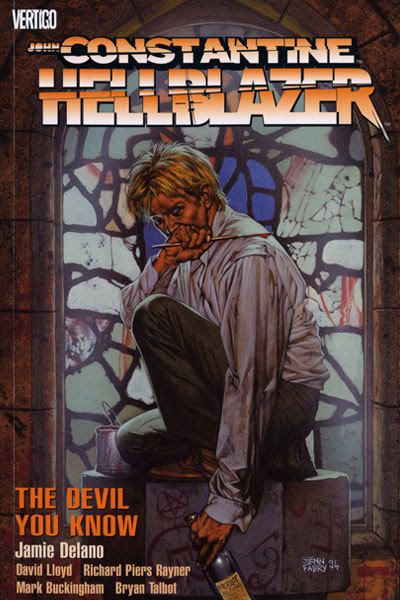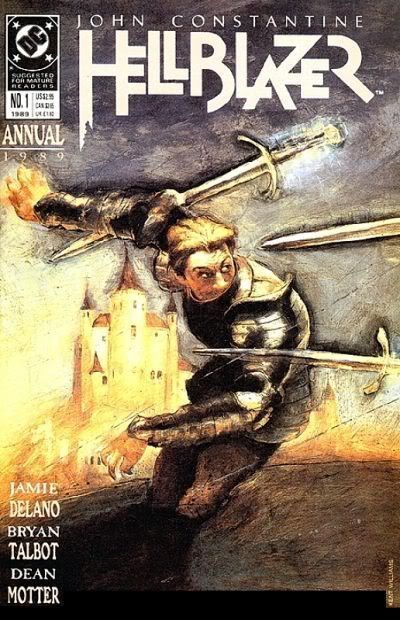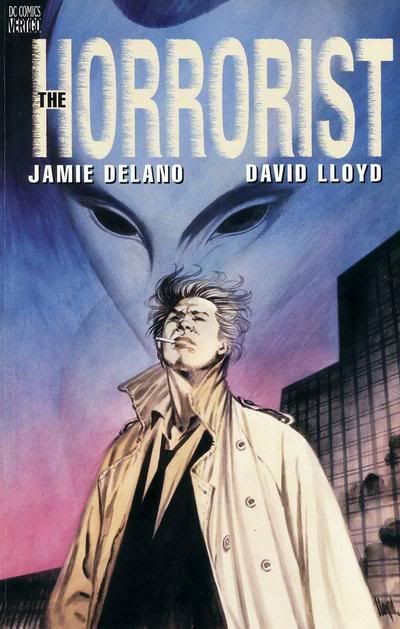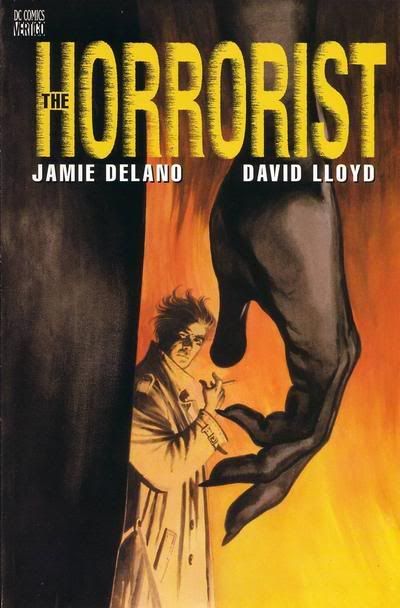My Life is Choked with Comics #17 - The Horrorist
/![]() "I'll tell you the ultimate secret of magic. Any cunt could do it."
"I'll tell you the ultimate secret of magic. Any cunt could do it."

So said John Constantine to Alan Moore on one particular occasion. Sure, Constantine was (and remains) a fictional character, and Moore was (and, desire of attribution aside, remains) his mortal co-creator, but, you know, Glycon the snake puppet wasn't a real god either, and Moore's worship continues unabated. I suppose when all ideas are real, to some extent, it takes only a cloud of smoke duly puffed across the porch of corporeality for the idea of a working-class magician to personally impart his authentic proletarian message.
But I'm here to go on about stories, imaginary things all - and don't sweat it DC, we didn't need to be told as much in every edition anyway. My favorite John Constantine story -- of the less than one quarter I've read, mind you -- is currently collected in the trade paperback pictured above, the latecoming second volume of the (presumably) complete Hellblazer works of Jamie Delano, the title's first writer. The latecoming third volume, Hellblazer: The Fear Machine, is due next month.
Yeah, Hellblazer Annual #1, from 1989; tops in my book. Really fine Bryan Talbot art (ha, I just repeated myself), and actually rather bold in structure. The 'main' story is divided into two parts, the first set in 1982, and the second many hundreds of years prior (with a coda set again in '82, I suppose not long enough to get its own official part).
The two segments are really only connected by theme, with the '80s stuff seeing Constantine, fresh out of a mental hospital, wandering around London at the start of the Falklands War while pondering the nature of magic, which is a bit like his old puck rock career, all of it standing for his now-cooling idealism in the face of a demonic world. He then shacks up with a possibly-imaginary woman who tells him of the stealthy magics squirreled away in the architecture and heart of the city, wriggling "a silver snake of thin resolve" into him - my hallucinatory girlfriends have similar phallic properties, so you can tell why this tale's my favorite.
Part two follows the adventures of John's ancestor Kon-sten-tyn, an amusing mix of (not already unrelated) aspects of St. Constantine of Cornwall, St. Gildas' loathed trickster monarch Constantine of Dumnonia and the folkloric Constantine III of Arthurian succession. He's a rotten old bastard who keeps the head of Merlin around to recite epic poems about him, but he's devoted to keeping certain Old Ways alive. It's a great opportunity for Delano to riff on the Christian incursion into the magical basis of so much folklore, with his acrid hero gradually setting aside the bloody ways of epic heroism in favor of beautiful stealth, becoming like the enemy to subvert its foundation.
The origin of the rogue! No wonder our Constantine rises in the morning, at the end of that second part, ready to slink behind the popular culture and shout at the back of its head, his art and his magic one and the same. Same as a comic book, slightly obscured behind Hawk & Dove on the racks but shouting out against its none-to-veiled foes, a diabolical signature within the church of continuity, a fancy-pants sigil for which a title might need be devised.

All Hellblazer writers leave their mark on John Constantine, that mage and rake, that "insouciant, somewhat amoral occult dabbler and 'psychic detective' with a British working-class background," in Delano's own words; as Tom Spurgeon once remarked to founding series editor Karen Berger, the character is a bit like Dr. Who in that some of his appeal comes from watching him 'played' by different writers. But he also remains the same - Delano's take on the character certainly drew from Moore's (from his famed tenure on The Saga of the Swamp Thing), just as his caption-heavy writing style challenged the verbosity of the Magus at his purplest:
"Synapses flash and pop, like flashbulb supernovae as the particular passion of my being is caught up in a sub-atomic slam-dance."
"Consciousness is snatched by electron rip-tides and thinly spread through infinite spatial black, leaving thoughts -- rare sleeping islands -- separated by oceanic eternities."
"I'm stretched, elastic life wound in a double helix round the universal pole --"
"-- a string of neurons in the cosmic brain --"
"-- resonant, my being tuned to everything."
"Now, contraction catapults my soul into a new, triumphant birth. Rhapsodic, bathed in perfect grace, I sail for eons --"
"-- blessed in beatific tranquility, alive in a universe of glory --"
"-- at play with angels above the fierce and holy sun."
"But, transient as elemental thought, my voyage lasts but brief mellennia."
"Sweeping on a high, wide spiral turn, my ship of rapture founders, grounded on mortality's reef."
"Particles reassemble and memories coalesce around my swelling sense of self."
"I must start the long return to dull corporeality and reclaim my body's tawdry clay."
Those are the captions from a single two-page image in issue #7, documenting a man's trip through exotic Cyberspace, circa 1988; I left out the dialogue, but there's some of that too.
Moore would later claim that it seemed the tone of a lot of comics that drew from his influence was built from a bad mood he happened to be in at the time, but I think a more immediate effect was a replication of his 'novelistic' on-page writing, attempting to drag comics closer to 'real' books by dumping a lot more words into them. Moore, of course, would also display a grasp of structure so as to augment his vocabulary, something many later writers, the Delano of Hellblazer included, did not exhibit.
Yet, Delano's performance did have a defining pinch, and it wasn't just prickly thickets of words that did it - his work on the series married a distinctly angry blend of socio-political satire with a sometimes uneasy juggle of fantastic, even superheroic elements. There wasn't any Vertigo back then to systemically insulate the Suggested for Mature Readers contingent from the rest of the bunch, after all - when Delano had the young Constantine belt out a punk rock number in the aforementioned Annual, there was a reference to Superman contained therein, and it's impossible for the reader to forget that John isn't necessarily shouting in metaphor. Superman is real to John Constantine, and he's done absolutely fucking nothing to accomplish lasting change in Constantine's environment.
That perhaps made it all more effectively bitter -- and it rather matched the tenor of various actual DC superhero projects of the day, Alan Moore's bad mood and all -- but it also assured that Delano would be working loud, with typical adventure comic elements sometimes clanking around as the series found its footing. Early on, Constantine was more of a debonair globetrotter, jetting away to Africa and the US in his good blue suit to barge into decadent casinos, strike up an uneasy alliance with a near-supervillian in the heart of his lair and face off with a monster threat on a skyscraper rooftop. He was an antihero from the start, but he wore some cool fucking sunglasses while doing it - at least until Delano knocked them off, to force him to see the implications of his deeds.
The 'commentary' aspect was present from the start, and often shrill - issue #3 had establishing scenes in Hell (just like a Jack T. Chick comic), where demons are seen to behave like (gah!) yuppies and thrill over Tory election victories. Even as a few issues passed, and Delano began to hammer out a firmer vision of the character -- more haunted, more rumpled, more street-level, iller-fated and ruinous yet charismatic at heart -- his yen for booming consideration of local and global problems remained, sometimes to the exclusion of the comic's main character.
Issue #5 is maybe the first example of Constantine fading into the background, while Delano details world horror unfolding. The mischief of (awk!) televangelist magic causes a small, patriotic American town's departed sons -- they mostly died in Vietnam, but it's still the sort of place where old ladies are ready with a slap and lines like "Shut your lying face, traitor slut!" -- to return again, except they also take many horrid wartime acts home with them, believing the conflict to yet continue. So, good citizens are held at gunpoint, a kind woman is raped and an air strike is 'called in' via a helpful gasoline tanker exploding in everyone's face, save for John Constantine's, as he is too busy standing agog, ready to vow that he has learned something important from the whole awful experience, just like Buster Brown at the end of every Sunday.
It would be a motif of Delano's run: wicked magic as a manifestation of some world ill, and John Constantine as a sort of well-read everyman, ready and capable of affecting real change, but sometimes forced to merely treat the symptoms, or left to bear witness to the horror. And if any cunt can do magic, as one practitioner said to the other, then any dumb fuck can educate his or herself about the state of the world, right?
Hence, finally, the story in the title of the post, which is also collected in the book pictures way up top.

The Horrorist was a two-issue, Prestige Format miniseries released in the last month of 1995 and the first month of 1996. It came well after the end of Delano's proper run on the title (issue #40, 1991), and even his one-off return (issue #84, 1994), although Delano would still have more to do - his future-set Hellblazer Special: Bad Blood miniseries hit in 2000, and he's got an original graphic novel, Hellblazer: Pandemonium (with art by Jock), in the pipeline for later this year. The Horrorist didn't even bear the Hellblazer title. Hell, it was released under some 'creator participation' deal with Delano & artist David Lloyd retaining the copyright and DC keeping the trademarks.
Regardless, it is a culmination. It is, to my mind, as of right now, the ultimate Jamie Delano Hellblazer comic, the very conclusion of those themes and motifs delineated above. It has the best, most awful John Constantine, and the loudest, most screaming terror over the state of the world. Is it blunt? Over the top? Yes. But it goes so far, in so short a space, it leaves reality itself frayed to a disturbing degree, and thereby accomplishes something Delano's Hellblazer, as much affection as I have for it, never quite did - it's actually kinda scary. Or at least disquieting, on a base, primal level.
The tale begins with a strange woman appearing in a snow-covered park in Illinois. She sits impassively as children romp and play, their football in one panel covered with marks resembling the continents of the globe, in case you couldn't already guess in which direction the commentary was headed. The young Americans throw the world around with gross abandon, while a happy local fellow tries to strike up a conversation with the eerie woman. But she only stares at the kids' rough play, grasping her head as two of them make a dive straight into a famous banned-in-the-US commercial, Lloyd rendering the carnage as leaping Mattotti plumes of flame. The happy fellow then flashes back to 'Nam and sputters:
"Not now... not in the U.S.A."
The uncanny woman assures him that he's now fully incorrect:
"It happens everywhere."
Hey, I doubt John Constantine's punk anthems were terribly subtle either.
Speaking of which, the scene then shifts to Our Man, drinking and observing a pool game between local roughs. He orders a gin and tonic.
"Thass a queer's drink, innit?" queries a local man.
"Twenty-five quid if you suck my dick," replies Constantine.
"I'll do it for fifteen," declares a beautiful woman who appears out of nowhere.
It's the start of a great romance, one to make Kazuo Koike proud, although Constantine insists that he's ice cold, a characteristic Delano then proves by having a man's throat cut open and blood spilling in John Constantine's drink and he just doesn't care, he and the woman leaving bloody footprints (of apathy!) in the snow as they leave. Then the woman sets John up for some sexy whipping, but even her worst cannot flay Constantine's leathery skin of uncaring, hard-living isolation.
"Harder, you pathetic stiletto bitch! I still can't fuckin' feel it!"
The woman then weeps and begs Constantine to stay with her, to which he calls her bloody stupid and storms off into the cold. Ah, but fate has tricks in store for our chilly John Constantine! He has a vision of the spooky woman from the top of the story, at which point a trash can bomb explodes nearby (but a taste of what the rest of world feels so often, John Constantine!!), and he realizes that there's something out there that can make him feel. A quick trip to a photographer confirms the story of an African child adopted and brought to the US, her image stripped of context and used to sell shit, her gaze haunting - and Constantine is off once more to the US.
As you may have picked up by now, a lot of this work is about the US. It was the same for some of Delano's run on the proper Hellblazer book - I'm sure everyone knew where most of the audience was situated, and thus where a good portion of the critique ought to go. And some of The Horrorist is no more carefully-put than that that Vietnam story I mentioned above (again: "Shut your lying face, traitor slut!"), with several boorish American mega-fatties meeting with an awful fate. But there's an odd dichotomy at work in Delano's presentation: the Americans we see are often silly and ignorant when faced with the strange woman, but rather sympathetic when meeting with John Constantine, as if Delano is chiding himself, in-story, for his own narrative cruelties.
Thus, as the strange woman meets up with a grinning truck driver, well, we're told (via caption) that he doesn't give a shit about politics and pays no attention to the rest of the world! Soon he's staring at boxcars full of grasping hands as a train passes by. He insists to the women that they must be "deportees, or death-row cons. Murders, rapists, gangbangers... terrorists." But then he telephones his wife and finds out that his own children were just taken away for reeducation! Then his truck crashes and he dies. Wait, we don't find that out until the next issue.
In contrast, as Constantine confronts the former adoptive family of the curious woman, he acts with general callousness at their expected tale of death and woe, leaving without offering any comfort, then finding the happy fellow from the start of the book setting himself on fire as the first issue ends. John appreciates the woman's sense of irony, at least.

Now, I know what you're saying (because I installed microphones in your home): 'Jog, this comic gives me the impression of Jamie Delano impressing my head with a hammer, like what happened off-panel at the end of The Crow, only allegorically this time.' I would agree; that's a fair estimate. However: it is comprehensively impressive -- and very beautifully drawn, mind you -- damned intent on stretching Delano's concept of magic-as-global-awareness as far as it can possibly go, so far as to wind up in a funny, terrible place, the logical finale of Delano's Hellblazer.
Much of the first half of issue #2 is spent on the woman wreaking havoc on hapless Americans - as you can tell by now, her uncanny power is to bring atrocious problems often pegged as exclusive to 'less developed' nations into the US. Literally. As in, the happy local guy from the beginning didn't just see kids get blown up by landmines so as to goad him to suicide, they actually did get blown up, which means that those landmines 'always' existed in the park - the story is quite clear on this point. It follows that the grinning truck driver actually did see real boxcars full of people get carted around, and his kids did get sent to... a reeducation camp?
Being an admirer of the Austrian School of Comics Criticism, I shall dub this phenomenon 'fiat magic.' As in, the effect of the odd woman's 'spells' institutes wholesale shifts in the recent history of her immediate region so as to create the desired result. For example, a nervous driver nearly runs the woman over. He informs her that he has children waiting at home (uh oh!). Sure enough, he arrives back at the house to his beloved daughter and stocky son (who is grinning and watching violent American televised entertainment), only to discover that all their food is gone! And they've always been poor and are suddenly starving! Desperate, the man drags his beloved daughter into the car and pimps her right out to a nearby live sex show, which apparently has always existed to keep women in literal sex slavery.
You see? Fiat magic.
And Delano pushes it so hard -- and Lloyd's dreamlike images flow so steadily over the stones of realism -- that it does affect me, in tearing at history and situation like it's nothing. Like the simplest incantation can not only affect your perception of reality, but erase anything you'd previously thought and substitute a whole new history for you to have lived, always a worse one. Damn better than devil conservatives fucking around in Hell. It's more like Delano's first-ever Constantine story, the blue suit sunglasses skyscraper one, which saw its monster threat as a living manifestation of third world hunger set loose on New York - but John is worse off here, with a more experienced writer playing him.
Eventually, as it had to happen, Constantine and the woman meet up. Their conversation is charged with some self-reference, Constantine mocking the very premise of the book he's in:
"I know what you are... you're a bleedin' horrorist -- a redistributor of suffering, perpetrating revolutionary outrage in the cozy heartlands of oppression and complacency!"
But he admits there's worse things she could be:
"You could be a cold, dead-veined, old hell-junkie like me -- a burned-out, tourist voyeur..."
"Yeah... make a good epitaph, wouldn't it? 'John Constantine. He came, he saw... he took some fuckin' pictures.'"
It's a revealing thing to say, for a character made to witness many allegories of strife and suffering; done mocking the premise of his current book, could he be expressing doubt over the impact of his earlier affairs? Wasted and spent from his adventures, his writer long-gone - this is why The Horrorist seems consummate to me. It's both an expansion and a reflection of what Delano has done before, a long look taken at finished work with some time taken away from the stuff.
Anyway, the story climaxes with John Constantine and the woman ripping off their skin to have dripping muscle sex (this was in the Keanu Reeves movie, right?), at which point both envision brutal acts done, great trials suffered, the whole of world suffering crashing down upon them - quintessential Hellblazer. Then John wakes up. It seems he has fucked the woman to death, and she seems at peace (hmm, rather men's adventure there, like at the start!). Outside the world is burning from fallen shells - it's probably just the block, but I like to imagine the whole of the United States of America has totally collapsed. To hell with Superman continuity! Everyone is sad and dying, but Constantine is happy and smoking, his sexual experience having relit his passion for change, just as his dalliance with the imaginary woman did in the Annual #1. Always a rake.
"Goddamnit, it's true... I care about these fuckin' imbeciles again. I even care about myself."
This line is delivered with gleaming blue eyes as a bent-over person cradles his/her face in burning agony in the background - it's tempting to say that all of this horror came down on stupid, shitty, fat Americans (boooooo) as a means of doing nothing more than reawakening the kindly heart of salt-of-the-earth working-class soul of liberal humanism corporate-owned property John Constantine, a goal greater than anything else, but... the comic kind of admits that fault in its po-faced finale, John Constantine dancing around the ruins of a town/nation. I mean, when the book runs off of suffering, you've gotta fess up to the fuel you're using, you know?
And then, while John bends over to help a large person look for their lost child, we see the strange woman has gotten up and left, her blood stains formed into the very subtle shape of all the continents of the world! Her bloody footprints trail out of the final panel, across the inside-back cover, and right out of the comic - into your world, reader! Unless you bought the trade version I mentioned above, which omits all of that stuff!
No matter. We need to be told this no more than we need to know that Superman comics are imaginary. We're not John Constantine - we don't need to sing about him flying around.
But we can perform his magic. Like he told Alan Moore. Like he told us when Jamie Delano played him.
No fiat magic either. Soft as it could be, we've had a gold standard set.











